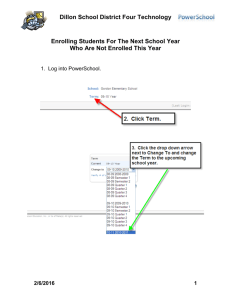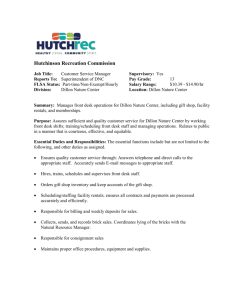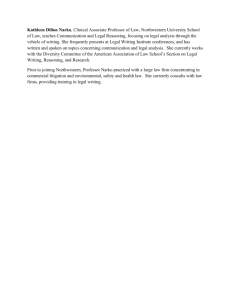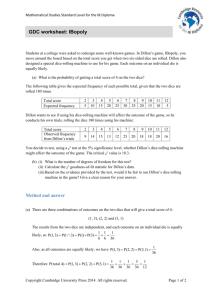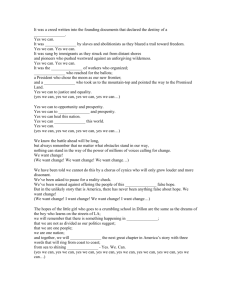1.10 - Philip Cryan Marshall
advertisement
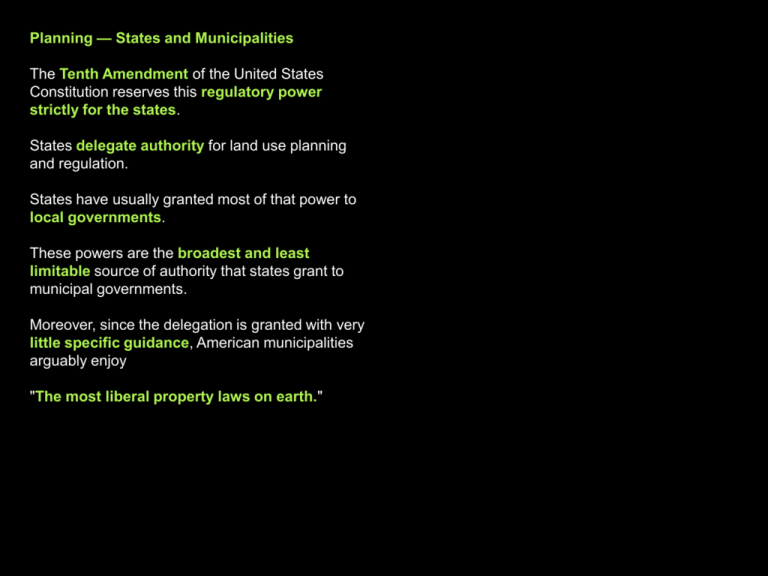
Planning — States and Municipalities The Tenth Amendment of the United States Constitution reserves this regulatory power strictly for the states. States delegate authority for land use planning and regulation. States have usually granted most of that power to local governments. These powers are the broadest and least limitable source of authority that states grant to municipal governments. Moreover, since the delegation is granted with very little specific guidance, American municipalities arguably enjoy "The most liberal property laws on earth." 1 Planning — States and Municipalities Local governments derive their authority to zone from state legislatures, either from: State constitutional home rule or enabling legislation. This delegated authority usually contains broad parameters allowing localities to zone principally to protect property owners from "negative externalities”. Municipalities then use this police power for the public good to classify, specify and identify land uses. Usually, the enabling statute or home rule legislation grants localities the appropriate means or tools to achieve zoning goals. Generally, the terms and conditions are broad, offering the municipality flexibility in exercising the delegated power because each situation involves unique variables that a state legislature is unable to predict. 2 Planning — States and Municipalities Home Rule Dillon’s Rule Under home rule, counties are viewed as being free to undertake activities unless expressly prohibited by the state. Under Dillon’s rule, counties are free to undertake only those activities that are explicitly allowed by the state. 3 Planning — States and Municipalities Home Rule 1 Home rule is the right of a town or city to enact laws that are municipal in nature and: • that do not frustrate or run counter to a state law and/or • that the state has not prohibited the town or city from passing. The concept of home rule is very important to local government because without home rule authority, cities and towns would depend on specific acts of the State Legislature for their governing authority. 4 Planning — States and Municipalities Home Rule 2 Home rule may be effected by an amendment to the state constitution to delegate broad "home rule" ordinance powers to cities and towns. Such ordinances may include: • • • • • • • controlling the barking of dogs regulation of adult businesses regulation of signs control of a town's growth review of real estate development projects banning of herbicide spraying regulation of local timber harvesting. 5 Planning — States and Municipalities New England Town Meeting The New England town meeting and school district meeting are the only direct democracy institutions in the United States involving lawmaking by assembled voters. A New England town meeting, except in Rhode Island, is called by the Board of Selectmen—the town's plural executive—which issues a warrant or warning of the place date and time of the meeting. The New England town meeting is a de facto representative body because the majority of eligible voters do not participate in the meeting except in very small towns. Attendance ranges from an average of nine percent in Connecticut towns, to 26 percent in Vermont towns. 6 Planning — States and Municipalities Dillon’s Rule 1 John Forrest Dillon, for whom the Dillon Rule is named, was the chief justice of the Iowa Supreme Court approximately 100 years ago. He was also one of the greatest authorities of his time on municipal law and a prolific writer on local governments. Judge Dillon was a man who greatly distrusted local governments and local government officials. He is quoted as saying that, "those best fitted by their intelligence, business experience, capacity and moral character' usually did not hold local office and that the conduct of municipal affairs was generally "unwise and extravagant." Perhaps largely because of such strong beliefs. Judge Dillon expounded his famous rule, which was quickly adopted by state supreme courts around the nation. 7 Planning — States and Municipalities Dillon’s Rule 2 Dillon's Rule is a “strict construction” interpretation of local government powers by courts. Lawyers call it a rule of statutory construction: a process by which a court seeks to interpret the meaning and scope of legislation. Dillon's Rule construes grants of power to localities very narrowly. Dillon’s Rule allows localities to possess only such powers as are specifically delegated to them by state law. If there is a question about a local government's power or authority, then the local government does not receive the benefit of the doubt. Under Dillon's rule, one must assume that the local government does not have the power in question. 8 Planning — States and Municipalities Dillon’s Rule 3 Local governments have only three types of powers, 1. 2. 3. those granted in express words, those necessarily or fairly implied in or incident to the powers expressly granted and those essential to the declared objects and purposes of the corporation, not simply convenient, but indispensable. 9 Planning — States and Municipalities Dillon’s Rule 4 Does "Dillon's Rule," preclude robust local action to curb sprawl? Thirty-nine states employ Dillon's Rule to define the power of local governments. Dillon's Rule neither prohibits nor hinders growth management. Strong local autonomy can complicate regional collaboration. Localities — rather than blaming Dillon's Rule for the shortcomings of growth management —need to reexamine their own regulations (which set the rules of the development game) and urge states to take a leadership role. 10
